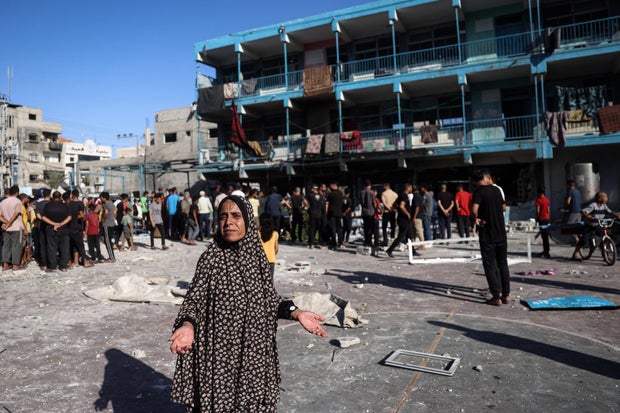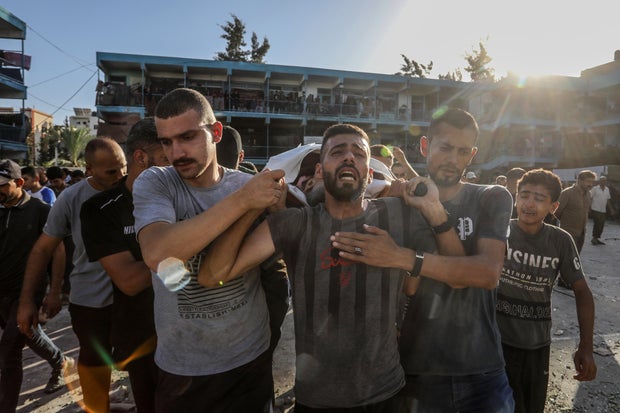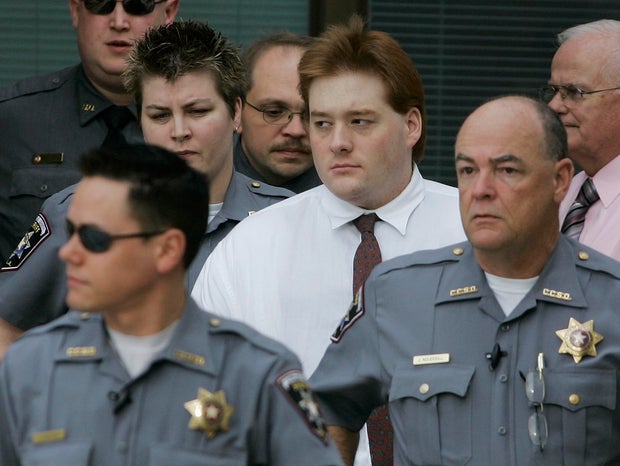CBS News
U.N. staff among 18 killed in Israeli strike on Gaza school sheltering displaced Palestinians, rescuers say

Gaza Strip — Israel bombed a school housing displaced Palestinians in Gaza on Wednesday, killing 18 people including two staffers with the United Nations agency for Palestinian refugees, UNRWA, according to rescuers. The Israeli military described it as a “precise strike on terrorists who were operating inside a command and control center embedded within a compound that previously served as the Al-Jaouni School” in the central Gaza district of Nuseirat.
The school had already been bombed several times over the course of Israel’s 11-month war with Hamas. The militant group ruled over Gaza for almost two decades before it sparked the ongoing war with its unprecedented Oct. 7 terrorist attack on Israel. That attack saw militants with Hamas and allied groups kill about 1,200 people and take some 250 others hostage.
According to health officials in the Hamas-run Palestinian territory, who do not differentiate between civilian and combatant casualties, the war has killed more than 41,000 people in Gaza so far. The strike on the school came a day after Israeli bombs slammed into a sprawling tent camp for displaced Palestinians in the al-Mawasi designated humanitarian zone, killing at least 40 people, according to Palestinian medics.
EYAD BABA/AFP/Getty
The Wednesday strike flattened part of the U.N.-run facility where Gazans had sought shelter, leaving only a charred heap of rebar and concrete.
UNRWA says 6 staffers killed in Israeli raids near Gaza school
“For the fifth time, Israeli forces bombed the UNRWA-run Al-Jawni School, killing 18 citizens, including two UNRWA staff members, children, and women, and injuring more than 18 others,” Mahmoud Basal, spokesperson for Gaza’s Civil Defense rescue agency, said in a social media post.
UNRWA later said six of its staffers had been killed in two Israeli air raids on the Nuseirat school and its surroundings, calling it the highest death toll among its team in a single incident.
“Among those killed was the manager of the UNRWA shelter and other team members providing assistance to displaced people,” the U.N. agency said in a post on X. “Schools and other civilian infrastructure must be protected at all times, they are not a target.”
In a post on social media, IDF spokesperson Avichay Adraee said the military had sought to verify UNRWA’s claims about the killing of its workers in the raid, but that UNRWA had not responded.
“The IDF approached the agency to receive names and details in order to examine the allegations in depth, but UNRWA did not respond to these requests which were repeatedly conveyed to it,” he said, adding that “names published on social media sites and news channels” as being among those killed in the strike “belong to terrorists from Hamas who were involved in terrorist activities against the citizens of Israel and the forces of the Defense Army.”
Abed Rahim Khatib/Anadolu/Getty
Across the besieged strip, many school buildings have been repurposed to shelter displaced families as the vast majority of Gaza’s 2.4 million people have been repeatedly uprooted by the war.
Israeli forces have struck several such schools in recent months, saying Palestinian militants were operating there and hiding among displaced civilians — charges denied by Hamas.
The IDF did not elaborate on the outcome of the strike, but repeated its frequent assertion that “numerous steps” were taken to reduce the risk to civilians.
The U.N. said last month that nine UNRWA staff members were fired after an internal investigation found they may have been involved in Hamas’ Oct. 7 attack on Israel.
Survivors of the strike scrambled to retrieve bodies and belongings from the rubble, telling AFP they had to step over “shredded limbs.”
“I can hardly stand up,” said one man, holding a plastic bag of human remains. “We’ve been going through hell for 340 days now. What we’ve seen over these days, we haven’t even seen it in Hollywood movies. Now we’re seeing it in Gaza.”
Further north in the Gaza Strip, the civil defense agency’s spokesman Basal said three people were killed overnight in Israeli shelling on the Jabalia refugee camp.
In Gaza City, he said there had been two deadly strikes in the Zeitoun neighborhood — the first killing five people, including two children, and the second killing two and injuring several others.
West Bank, Hezbollah violence escalate as Gaza cease-fire talks languish
Months of negotiations mediated by Qatar, Egypt and the United States have so far failed to secure a truce.
A Hamas delegation met Qatari and Egyptian mediators in Doha on Wednesday, the militant group said in a statement, though there was no indication of a breakthrough.
Recent rounds of mediation held in Doha and Cairo have tried to hash out a framework laid out in May by President Biden, but both Israel and Hamas have publicly signaled deeper entrenchment in their negotiating positions as the violence has not only continued in Gaza, but escalated in two other key areas, fueling concern that without a truce agreement, the conflict could spread.
Tension has soared in the other Palestinian territory, the Israeli-occupied West Bank, which is not controlled by Hamas. The killing there by an Israeli soldier on Friday of an American activist has drawn criticism from Washington of the Israeli military’s tactics and demands for independent investigations.
The IDF said an initial investigation showed Aysenur Eygi was “highly likely” shot accidentally by one of its soldiers responding to a violent protest, but eyewitnesses have said she was shot in the head after the unrest died down and as she stood under an olive tree.
U.S. Secretary of State Antony Blinken called her killing “both unprovoked and unjustified,” and said the IDF must change its tactics, but U.S. authorities have not announced an independent investigation into the shooting as requested by the family. Eygi was also a Turkish national, and the Turkish justice department confirmed Thursday that it was carrying out its own investigation into her killing and would present its evidence to a U.N. court handling a genocide case against Israel brought by South Africa over the war in Gaza.
Further north, along Israel’s border with Lebanon, meanwhile, there’s mounting concern that Israel will launch a major offensive against the more powerful Hamas-allied group Hezbollah. The group, which like Hamas is backed by Iran, has exchanged increasing cross-border rocket fire with Israel for months, and Israeli officials have vowed to eliminate the threat.
U.S. and other Western officials have warned for months that if that crossfire develops into a more direct fight between Israel and Hezbollah, it could snowball into a wider regional conflict that draws a response from Iran or its regional proxy forces, which have already targeted U.S. forces in the region with rocket and drone attacks.
CBS News
Google Maps helps solve murder mystery by capturing moment a person put suspected corpse into car in Spain

Google Maps has guided Spanish investigators to resolve a year-long murder mystery by capturing the moment a person stowed a suspected corpse into a car.
Police in the northern region of Castile and Leon began their probe in November 2023 when someone reported the disappearance of a male relative.
Officers arrested a woman who was the missing male’s partner and another man who was her ex-partner in Soria province on November 12, police said in a statement on Wednesday.
Investigators then raided the suspects’ homes and inspected their vehicles but also stumbled on an unexpected lead in the search for further clues.
These were “images in a location application” where they “detected a vehicle that may have been used during the course of the crime,” the statement said.
Spanish media circulated pictures of a screenshot of Google Maps’ Street View from October 2024 showing a person dumping an object covered in a white shroud into a car trunk in the village of Tajueco. It was the first time in 15 years that the car had been to the town of Tajueco, the BBC reported.
The images contributed to resolving the case, though they were not “decisive,” police said.
Officials said another photo sequence shows the blurred silhouette of someone transporting a large white bundle in a wheelbarrow, the BBC reported.
The central government’s representative in Soria, Miguel Latorre, told public broadcaster RTVE the person “can presumably be” considered the culprit.
Police said a severely decomposed human torso believed to belong to the victim had been found this month in a cemetery in Soria province. El Pais daily reported that he was a 33-year-old Cuban.
A judge has ordered the suspects into custody and the investigation remains open.
This marks at least the second time that Google technology has helped crack a cold case. In 2019, the remains of a man missing for 22 years were finally found thanks to someone who zoomed in on his former Florida neighborhood with Google satellite images and noticed a car submerged in a lake.
CBS News
2 soldiers killed by landmine blast in Mexico day after 2 troops killed by booby trap in same region

A blast killed two Mexican soldiers in the second deadly incident this week involving an improvised landmine in a crime-plagued western state, authorities said Wednesday.
According to the El Universal newspaper, the soldiers were trying to deactivate the device when it exploded.
The blast happened late on Tuesday in Buenavista in Michoacan, the state prosecutor’s office said.
A military source who did not want to be named said that troops were looking for similar devices believed to have been planted in the area.
On Monday, a blast caused by another improvised landmine killed two Mexican soldiers and wounded five others in the same region. Before the explosion, the soldiers had discovered the dismembered bodies of three people, officials said.
The device was suspected to have been planted by members of a local criminal group waging a turf war with a bigger drug cartel, Defense Minister Ricardo Trevilla said Tuesday.
Six other soldiers had been killed by similar improvised devices since late 2018, he said.
Mexico is plagued by widespread drug-related violence that has seen more than 450,000 people killed since the government deployed the army to combat trafficking in 2006, according to official figures.
In the only previous detailed report on cartel bomb attacks in August 2023, the defense department said at that time that a total of 42 soldiers, police and suspects were wounded by IEDs in the first seven and a half months of 2023, up from 16 in all of 2022.
Overall, 556 improvised explosive devices of all types – roadside, drone-carried and car bombs – were found in 2023, the army said in a news release last year.
CBS News
Oklahoma set to execute man who killed girl, 10, during cannibalistic fantasy

Oklahoma is preparing to execute a man who killed a 10-year-old girl in what would be the nation’s 25th and final execution of the year.
Kevin Ray Underwood is scheduled to die by lethal injection on Thursday, his 45th birthday, at the Oklahoma State Penitentiary in McAlester. Underwood, a former grocery store worker, was sentenced to die for killing Jamie Rose Bolin in 2006 as part of a cannibalistic fantasy.
Underwood admitted to luring Jamie into his apartment and beating her over the head with a cutting board before suffocating and sexually assaulting her. He told investigators that he nearly beheaded the girl in his bathtub before abandoning his plans to eat her.
Sue Ogrocki / AP
Oklahoma uses a three-drug lethal injection process that begins with the sedative midazolam followed by a second drug that paralyzes the inmate to halt their breathing and a third that stops their heart.
During a hearing last week before the state’s Pardon and Parole Board, Underwood told the girl’s family he was sorry.
“I would like to apologize to the victim’s family, to my own family and to everyone in that room today that had to hear the horrible details of what I did,” Underwood said to the board via a video feed from the Oklahoma State Penitentiary.
The three board members in attendance at last week’s meeting all voted against recommending clemency.
Underwood’s attorneys had argued that he deserved to be spared from death because of his long history of abuse and serious mental health issues that included autism, obsessive-compulsive disorder, bipolar and panic disorders, post-traumatic stress disorder, schizotypal personality disorder and various deviant sexual paraphilias.
His mother, Connie Underwood, tearfully asked the board to grant her son mercy.
“I can’t imagine the heartache the family of that precious girl is living with every single day,” Connie Underwood said. “I wish we understood his pain before it led to this tragedy.”
But several members of Bolin’s family asked the board to reject Underwood’s clemency bid. The girl’s father, Curtis Bolin, was scheduled to testify to the board but became choked up as he held his head in his hand.
“I’m sorry, I can’t,” he said.
Prosecutors wrote in opposing Underwood’s clemency request that, “Whatever deviance of the mind led Underwood to abduct, beat, suffocate, sexually abuse and nearly decapitate Jamie cannot be laid at the feet of depression, anxiety or (autism).
“Underwood is dangerous because he is smart, organized and driven by deviant sexual desires rooted in the harm and abuse of others.”
In a last-minute request seeking a stay of execution from the U.S. Supreme Court, Underwood’s attorneys argued that he deserves a hearing before the full five-member parole board and that the panel violated state law and Underwood’s rights by rescheduling its hearing at the last minute after two members of the board resigned.










